《茶花女》英文读后感
茶花女英文读后感.doc
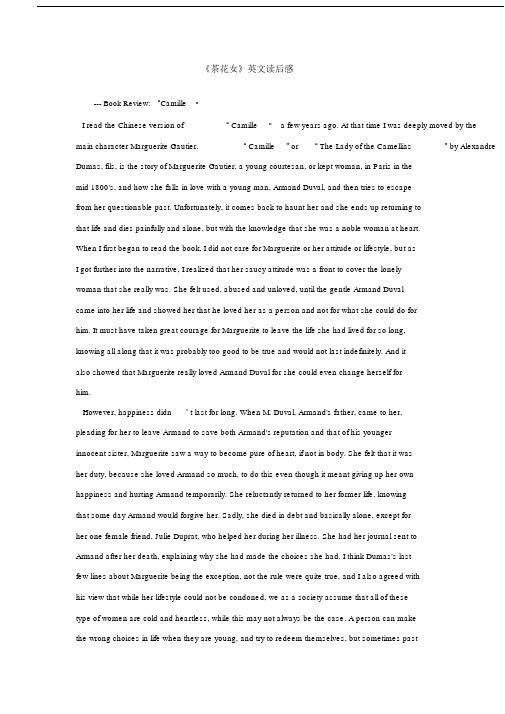
《茶花女》英文读后感--- Book Review: “Camille ”I read the Chinese version of “ Camille ” a few years ago. At that time I was deeply moved by the main character Marguerite Gautier.“ Camille” or“ The Lady of the Camellias ” by Alexandre Dumas, fils, is the story of Marguerite Gautier, a young courtesan, or kept woman, in Paris in themid 1800's, and how she falls in love with a young man, Armand Duval, and then tries to escapefrom her questionable past. Unfortunately, it comes back to haunt her and she ends up returning tothat life and dies painfully and alone, but with the knowledge that she was a noble woman at heart.When I first began to read the book, I did not care for Marguerite or her attitude or lifestyle, but asI got further into the narrative, I realized that her saucy attitude was a front to cover the lonelywoman that she really was. She felt used, abused and unloved, until the gentle Armand Duvalcame into her life and showed her that he loved her as a person and not for what she could do forhim. It must have taken great courage for Marguerite to leave the life she had lived for so long,knowing all along that it was probably too good to be true and would not last indefinitely. And italso showed that Marguerite really loved Armand Duval for she could even change herself forhim.However, happiness didn’ t last for long. When M. Duval, Armand's father, came to her,pleading for her to leave Armand to save both Armand's reputation and that of his youngerinnocent sister, Marguerite saw a way to become pure of heart, if not in body. She felt that it washer duty, because she loved Armand so much, to do this even though it meant giving up her ownhappiness and hurting Armand temporarily. She reluctantly returned to her former life, knowingthat some day Armand would forgive her. Sadly, she died in debt and basically alone, except forher one female friend, Julie Duprat, who helped her during her illness. She had her journal sent toArmand after her death, explaining why she had made the choices she had. I think Dumas's lastfew lines about Marguerite being the exception, not the rule were quite true, and I also agreed withhis view that while her lifestyle could not be condoned, we as a society assume that all of thesetype of women are cold and heartless, while this may not always be the case. A person can makethe wrong choices in life when they are young, and try to redeem themselves, but sometimes pastsituations prevent them from changing their lives, even though they desperately wish to do so.This applies to both men and women in many different types of circumstances: involvement incrime; drug or alcohol abuse; gambling; prostitution; financial problems; poor marriage choices;etc. And this is the fact, which exists in the whole society.As far as the other characters in the book, I think Marguerite was right in saying that no onetruly cared about her, but only wanted something from her, the only exceptions being Armand andJulie Duprat. Of course, the Comte de G. and Comte de N. wanted her body and appearance. TheDuke needed to “ wake up and smell the coffee ” and realize that she could never replace his dead daughter. If he truly cared, he could have helped her leave her lifestyle without“ keepin himself. And lastly, Prudence was a blood-sucking leech who used Marguerite almost worse thanthe men. I also think she was jealous of the fact that Marguerite had so much more courage thanherself and someone truly loved her.Last morning, when tiding my bookshelf, I took this book out of the shelf, and a dried flower flewaway from the book. It was pale blue, very transparent, with thin fine veins. a dried flower flewaway from the book. It was pale blue, very transparent, with thin fine veins. I held it against themorning light and blew on it. The soft breeze carried it away. Camille is just like the camellia, shecould never escape from the destiny of withering. But it wasn ’ t her fault; it ’ s because of Capitalism and the hideousness of that society.Suddenly, I remembered a saying:“ Women are like the flowers tty women”.Thosearelikeprethose beautiful flowers; their delicate beauty makes people feel they are the miracle of life.However, even the God envies their beauty. It seems that beautiful women always have tragicendings. As we are normal persons, even we can see the hideousness of humanity that results intheir fate of withering, we can at most ask quietly in our hearts: Where have those beautifulflowers gone? Where have they gone?。
英语读后感作文:《茶花女》英文读后感_优秀英语作文

英语读后感作文:《茶花女》英文读后感---Book Review: “Camille”I read the Chinese version of “Camille” a few years ago. At that time I was deeply moved by the main character Marguerite Gautier. “Camille”or “The Lady of the Camellias” by Alexandre Dumas, fils, is the story of Marguerite Gautier, a young courtesan, or kept woman, in Paris in the mid 1800's, and how she falls in love with a young man, Armand Duval, and then tries to escape from her questionable past. Unfortunately, it comes back to haunt her and she ends up returning to that life and dies painfully and alone, but with the knowledge that she was a noble woman at heart. When I first began to read the book, I did not care for Marguerite or her attitude or lifestyle, but as I got further into the narrative, I realized that her saucy attitude was a front to cover the lonely woman that she really was. She felt used, abused and unloved, until the gentle Armand Duval came into her life and showed her that he loved her as a person and not for what she could do for him. It must have taken great courage for Marguerite to leave the life she had lived for so long, knowing all along that it was probably too good to be true and would not last indefinitely. And it also showed that Marguerite really loved Armand Duval for she could even change herself for him.However, happiness didn’t last for long. When M. Duval, Armand's father, came to her, pleading for her to leave Armand to save both Armand's reputation and that of his younger innocent sister, Marguerite saw a way to become pure of heart, if not in body. She felt that it was her duty, because she loved Armand so much, to do this even though it meant giving up her own happiness and hurting Armand temporarily. She reluctantlyreturned to her former life, knowing that some day Armand would forgive her. Sadly, she died in debt and basically alone, except for her one female friend, Julie Duprat, who helped her during her illness. She had her journal sent to Armand after her death, explaining why she had made the choices she had. I think Dumas's last few lines about Marguerite being the exception, not the rule were quite true, and I also agreed with his view that while her lifestyle could not be condoned, we as a society assume that all of these type of women are cold and heartless, while this may not always be the case. A person can make the wrong choices in life when they are young, and try to redeem themselves, but sometimes past situations prevent them from changing their lives, even though they desperately wish to do so. This applies to both men and women in many different types of circumstances: involvement in crime; drug or alcohol abuse; gambling; prostitution; financial problems; poor marriage choices; etc. And this is the fact, which exists in the whole society.As far as the other characters in the book, I think Marguerite was right in saying that no one truly cared about her, but only wanted something from her, the only exceptions being Armand and Julie Duprat. Of course, the Comte de G. and Comte de N. wanted her body and appearance. The Duke needed to “wake up and smell the coffee” and realize that she could never replace his dead daughter. If he truly cared, he could have helped her leave her lifestyle without “keeping” her himself. And lastly, Prudence was a blood-sucking leech who used Marguerite almost worse than the men. I also think she was jealous of the fact that Marguerite had so much more courage than herself and someone truly loved her.。
《茶花女》英文读后感
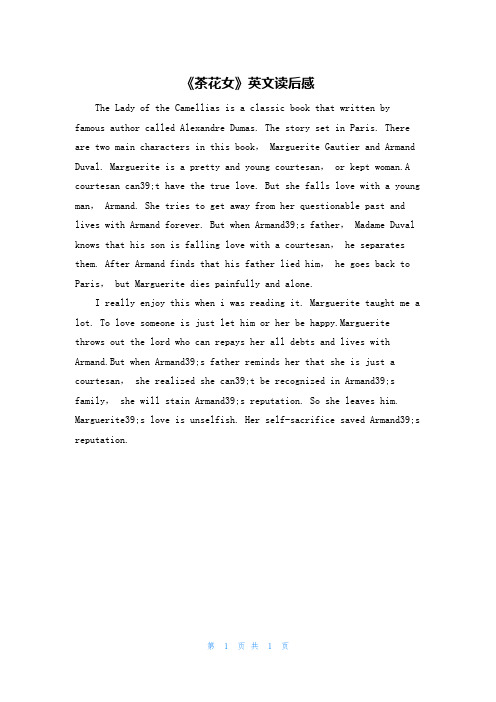
《茶花女》英文读后感The Lady of the Camellias is a classic book that written by famous author called Alexandre Dumas. The story set in Paris. There are two main characters in this book, Marguerite Gautier and Armand Duval. Marguerite is a pretty and young courtesan, or kept woman.A courtesan can39;t have the true love. But she falls love with a young man, Armand. She tries to get away from her questionable past and lives with Armand forever. But when Armand39;s father, Madame Duval knows that his son is falling love with a courtesan, he separates them. After Armand finds that his father lied him, he goes back to Paris, but Marguerite dies painfully and alone.I really enjoy this when i was reading it. Marguerite taught me a lot. To love someone is just let him or her be happy.Marguerite throws out the lord who can repays her all debts and lives with Armand.But when Armand39;s father reminds her that she is just a courtesan, she realized she can39;t be recognized in Armand39;s family, she will stain Armand39;s reputation. So she leaves him. Marguerite39;s love is unselfish. Her self-sacrifice saved Armand39;s reputation.第 1 页共 1 页。
[英语作文]《茶花女》读后感英语作文带翻译
![[英语作文]《茶花女》读后感英语作文带翻译](https://img.taocdn.com/s3/m/115a63ce2af90242a995e53d.png)
[英语作文]《茶花女》读后感英语作文带翻译《茶花女》读后感英语作文带翻译La dame aux camelias alexandre dumas, French is the author of this novel, let me feel too deep, the feeling is too deep.Ancient beauty rush, more beautiful appearance bring infinite sadness and tragedy. While prostitutes, especially beautiful and talented prostitute, go along this road is hard. Such as ten niangs, fear and love and hate into the spring waters flowed eastward; Chen sisi, round fate is also a sigh, a helpless. And I've seen la dame aux camelias after just understand this kind of tragedy is not only happened in China.This is Margaret's love tragedy story. The humble a weak woman indissolute and no purpose to find the true love in life, used to abandon their material comforts, gave up everything to make yourself happy for the time being the erosion life habit, can only to ask and favorite people together. To climb out, from the deep mire is to spend a lot of strength and determination, and also make their minimum mud pollution. Margaret did, and do very well. Can be so great, in return for the remains of people don't understand and exclusion, and selfish people malicious slander. Huge resistance to Margaret and eventually lovers separated, misunderstanding to your most favorite people need comfort to expose her, this is how painful thing? Perhaps really only death can save her. Yes, Margaret died, died lonely, never alive when luxury, countless lovers also forget her before. Before the more sensation of life, death, the more cold and cheerless.Thank dumas created such a sad La Traviata and lovely beautiful woman. However, in the hope that the dead flower bud from the soil, rebirth again, away from the dark corner, can every day and the sun company, even if no longer so beautiful, don't repeat the tragedy of the past.《茶花女》的作者是法国的亚历山大・小仲马,这本小说,让我感触太深,感悟也太深。
茶花女读后感英语
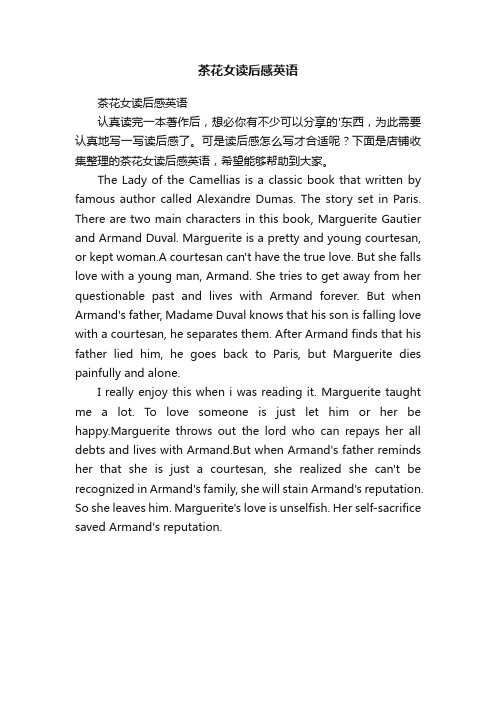
茶花女读后感英语茶花女读后感英语认真读完一本著作后,想必你有不少可以分享的'东西,为此需要认真地写一写读后感了。
可是读后感怎么写才合适呢?下面是店铺收集整理的茶花女读后感英语,希望能够帮助到大家。
The Lady of the Camellias is a classic book that written by famous author called Alexandre Dumas. The story set in Paris. There are two main characters in this book, Marguerite Gautier and Armand Duval. Marguerite is a pretty and young courtesan, or kept woman.A courtesan can't have the true love. But she falls love with a young man, Armand. She tries to get away from her questionable past and lives with Armand forever. But when Armand's father, Madame Duval knows that his son is falling love with a courtesan, he separates them. After Armand finds that his father lied him, he goes back to Paris, but Marguerite dies painfully and alone.I really enjoy this when i was reading it. Marguerite taught me a lot. To love someone is just let him or her be happy.Marguerite throws out the lord who can repays her all debts and lives with Armand.But when Armand's father reminds her that she is just a courtesan, she realized she can't be recognized in Armand's family, she will stain Armand's reputation. So she leaves him. Marguerite's love is unselfish. Her self-sacrifice saved Armand's reputation.。
《茶花女》英文读后感 (2)
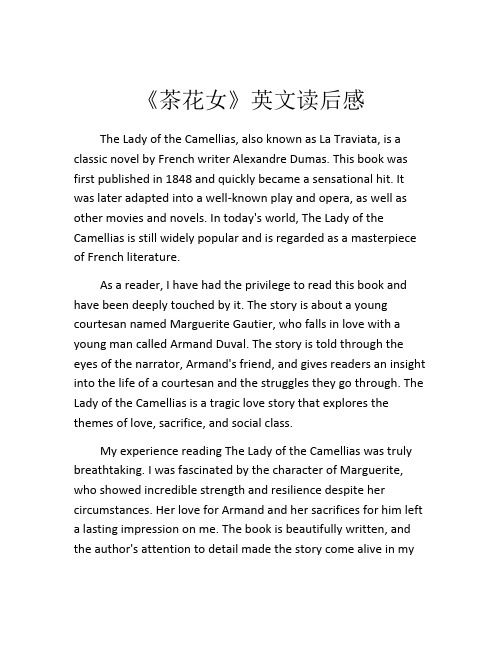
《茶花女》英文读后感The Lady of the Camellias, also known as La Traviata, is a classic novel by French writer Alexandre Dumas. This book was first published in 1848 and quickly became a sensational hit. It was later adapted into a well-known play and opera, as well as other movies and novels. In today's world, The Lady of the Camellias is still widely popular and is regarded as a masterpiece of French literature.As a reader, I have had the privilege to read this book and have been deeply touched by it. The story is about a young courtesan named Marguerite Gautier, who falls in love with a young man called Armand Duval. The story is told through the eyes of the narrator, Armand's friend, and gives readers an insight into the life of a courtesan and the struggles they go through. The Lady of the Camellias is a tragic love story that explores the themes of love, sacrifice, and social class.My experience reading The Lady of the Camellias was truly breathtaking. I was fascinated by the character of Marguerite, who showed incredible strength and resilience despite her circumstances. Her love for Armand and her sacrifices for him left a lasting impression on me. The book is beautifully written, and the author's attention to detail made the story come alive in mymind. I was transported to 19th century France and felt like I was experiencing the story firsthand.The Lady of the Camellias is not just a story about love; it is a story about societal norms and the struggles that people have to go through to break free from them. The character of Marguerite represents the struggle of women to establish their independence and the challenges that society puts in their way. The story is still relevant today, and it speaks volumes about how far we have come as a society and the progress that still needs to be made.The Lady of the Camellias is a book that is not only important for its storytelling but also for its historical significance. It is an excellent representation of French literature and has played a significant role in shaping modern French culture. The book has been adapted into plays and operas that have been performed all over the world, making it a cultural icon.In conclusion, The Lady of the Camellias is a book that has stood the test of time and has continued to captivate readers for centuries. Its relevance today is a testament to its timeless message and the universality of its themes. The book is amust-read for anyone who wants to have a deeper understanding of French literature and the human condition. As a reader, I would highly recommend this book to anyone who loves a good love story and wants to experience the magic of Alexandre Dumas's writing.。
茶花女英文读后感(优秀7篇)
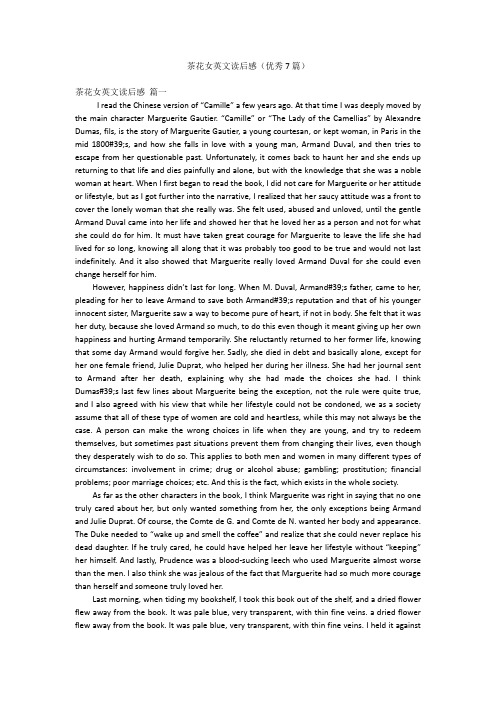
茶花女英文读后感(优秀7篇)茶花女英文读后感篇一I read the Chinese version of “Camille” a few years ago. At that time I was deeply moved by the main character Marguerite Gautier. “Camille” or “The Lady of the Camellias” by Alexandre Dumas, fils, is the story of Marguerite Gautier, a young courtesan, or kept woman, in Paris in the mid 1800#39;s, and how she falls in love with a young man, Armand Duval, and then tries to escape from her questionable past. Unfortunately, it comes back to haunt her and she ends up returning to that life and dies painfully and alone, but with the knowledge that she was a noble woman at heart. When I first began to read the book, I did not care for Marguerite or her attitude or lifestyle, but as I got further into the narrative, I realized that her saucy attitude was a front to cover the lonely woman that she really was. She felt used, abused and unloved, until the gentle Armand Duval came into her life and showed her that he loved her as a person and not for what she could do for him. It must have taken great courage for Marguerite to leave the life she had lived for so long, knowing all along that it was probably too good to be true and would not last indefinitely. And it also showed that Marguerite really loved Armand Duval for she could even change herself for him.However, happiness didn’t last for long. When M. Duval, Armand#39;s father, came to her, pleading for her to leave Armand to save both Armand#39;s reputation and that of his younger innocent sister, Marguerite saw a way to become pure of heart, if not in body. She felt that it was her duty, because she loved Armand so much, to do this even though it meant giving up her own happiness and hurting Armand temporarily. She reluctantly returned to her former life, knowing that some day Armand would forgive her. Sadly, she died in debt and basically alone, except for her one female friend, Julie Duprat, who helped her during her illness. She had her journal sent to Armand after her death, explaining why she had made the choices she had. I think Dumas#39;s last few lines about Marguerite being the exception, not the rule were quite true, and I also agreed with his view that while her lifestyle could not be condoned, we as a society assume that all of these type of women are cold and heartless, while this may not always be the case. A person can make the wrong choices in life when they are young, and try to redeem themselves, but sometimes past situations prevent them from changing their lives, even though they desperately wish to do so. This applies to both men and women in many different types of circumstances: involvement in crime; drug or alcohol abuse; gambling; prostitution; financial problems; poor marriage choices; etc. And this is the fact, which exists in the whole society.As far as the other characters in the book, I think Marguerite was right in saying that no one truly cared about her, but only wanted something from her, the only exceptions being Armand and Julie Duprat. Of course, the Comte de G. and Comte de N. wanted her body and appearance. The Duke needed to “wake up and smell the coffee” and realize that she could never replace his dead daughter. If he truly cared, he could have helped her leave her lifestyle without “keeping” her himself. And lastly, Prudence was a blood-sucking leech who used Marguerite almost worse than the men. I also think she was jealous of the fact that Marguerite had so much more courage than herself and someone truly loved her.Last morning, when tiding my bookshelf, I took this book out of the shelf, and a dried flower flew away from the book. It was pale blue, very transparent, with thin fine veins. a dried flower flew away from the book. It was pale blue, very transparent, with thin fine veins. I held it againstthe morning light and blew on it. The soft breeze carried it away. Camille is just like the camellia, she could never escape from the destiny of withering. But it wasn’t her fault; it’s because of the evil of Capitalism and the hideousness of that society.Suddenly, I remembered a saying: “Women are like the flowers”。
名著《茶花女》英语读后感
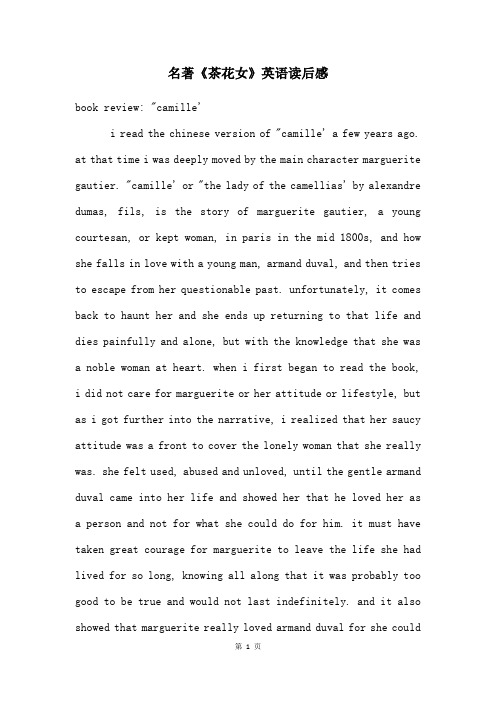
名著《茶花女》英语读后感book review: "camille'i read the chinese version of "camille' a few years ago. at that time i was deeply moved by the main character marguerite gautier. "camille' or "the lady of the camellias' by alexandre dumas, fils, is the story of marguerite gautier, a young courtesan, or kept woman, in paris in the mid 1800s, and how she falls in love with a young man, armand duval, and then tries to escape from her questionable past. unfortunately, it comes back to haunt her and she ends up returning to that life and dies painfully and alone, but with the knowledge that she was a noble woman at heart. when i first began to read the book, i did not care for marguerite or her attitude or lifestyle, but as i got further into the narrative, i realized that her saucy attitude was a front to cover the lonely woman that she really was. she felt used, abused and unloved, until the gentle armand duval came into her life and showed her that he loved her as a person and not for what she could do for him. it must have taken great courage for marguerite to leave the life she had lived for so long, knowing all along that it was probably too good to be true and would not last indefinitely. and it also showed that marguerite really loved armand duval for she couldeven change herself for him.however, happiness didnt last for long. when m. duval, armands father, came to her, pleading for her to leave armand to save both armands reputation and that of his younger innocent sister, marguerite saw a way to become pure of heart, if not in body. she felt that it was her duty, because she loved armand so much, to do this even though it meant giving up her own happiness and hurting armand temporarily. she reluctantly returned to her former life, knowing that some day armand would forgive her. sadly, she died in debt and basically alone, except for her one female friend, julie duprat, who helped her during her illness. she had her journal sent to armand after her death, explaining why she had made the choices she had. i think dumass last few lines about marguerite being the exception, not the rule were quite true, and i also agreed with his view that while her lifestyle could not be condoned, we as a society assume that all of these type of women are cold and heartless, while this may not always be the case. a person can make the wrong choices in life when they are young, and try to redeem themselves, but sometimes past situations prevent them from changing their lives, even though they desperately wish to do so. this applies to both men and women in many different types of circumstances:involvement in crime; drug or alcohol abuse; gambling; prostitution; financial problems; poor marriage choices; etc. and this is the fact, which exists in the whole society.as far as the other characters in the book, i think marguerite was right in saying that no one truly cared about her, but only wanted something from her, the only exceptions being armand and julie duprat. of course, the comte de g. and comte de n. wanted her body and appearance. the duke needed to "wake up and smell the coffee' and realize that she could never replace his dead daughter. if he truly cared, he could have helped her leave her lifestyle without "keeping' her himself. and lastly, prudence was a bloodsucking leech who used marguerite almost worse than the men. i also think she was jealous of the fact that marguerite had so much more courage than herself and someone truly loved her.last morning, when tiding my bookshelf, i took this book out of the shelf, and a dried flower flew away from the book. it was pale blue, very transparent, with thin fine veins. a dried flower flew away from the book. it was pale blue, very transparent, with thin fine veins. i held it against the morning light and blew on it. the soft breeze carried it away. camille is just like the camellia, she could never escape from thedestiny of withering. but it wasnt her fault; its because of the evil of capitalism and the hideousness of that society. suddenly, i remembered a saying: "women are like the flowers'. those pretty women are like those beautiful flowers; their delicate beauty makes people feel they are the miracle of life. however, even the god envies their beauty. it seems that beautiful women always have tragic endings. as we are normal persons, even we can see the hideousness of humanity that results in their fate of withering, we can at most ask quietly in our hearts: where have those beautiful flowers gone? where have they gone?。
- 1、下载文档前请自行甄别文档内容的完整性,平台不提供额外的编辑、内容补充、找答案等附加服务。
- 2、"仅部分预览"的文档,不可在线预览部分如存在完整性等问题,可反馈申请退款(可完整预览的文档不适用该条件!)。
- 3、如文档侵犯您的权益,请联系客服反馈,我们会尽快为您处理(人工客服工作时间:9:00-18:30)。
《茶花女》英文读后感美丽的悲剧----《茶花女》墙角里钻出一朵茶花。
一个阴冷、黑暗、潮湿、没有阳光的墙角,糜烂是它的养料。
然而,这茶花却比别的茶花,甚至别的任何一种花都美丽,美得脱俗,美得惊人,美得如痴如醉。
可凡是花都是向往阳光的。
努力、再努力一点,在茶花碰触到阳光那一刹那,在它因阳光的滋润而娇艳欲滴的那一刹那,无情的风折断了花枝,让它又倒在了阴冷的角落,无力再爬起,再去触摸那伸手可及的阳光。
上帝是仁慈的,为了弥补命运对它的不公,没让它凋零后再死,而是让它保持着美貌离开了世间。
玛格丽特的爱情悲剧故事 __的。
一介弱质女流在放荡且无目的的生命中找寻到了真爱,为此放弃了自己习以为常的大量物质享受,放弃了一切能使自己暂时快乐的糜烂生活习惯,只为求能和最爱的人呆在一起。
要从深陷的泥潭中爬出来,是要花很大的力气和决心的,况且还要使自己最小程度地被泥水污染。
玛格丽特做到了,而且做的非常出色。
可如此巨大的付出,换回的仍是人们的不理解和排挤,还有自私的人们的恶意中伤。
巨大的阻力最终还是使玛格丽特和爱人分开了,误会使最爱的人再自己最需要安慰的时候羞辱她,这是何等痛苦的事情?也许真的只有死亡可以拯救她。
是的,玛格丽特死了,孤独的死去,再也没了活着时的奢华,以前无数的情人也忘了她。
生前的生活愈是轰动,死的时候就愈是冷清。
亦或许,玛格丽特并不是个完全的悲剧人物,至少,她得到了真爱,她的灵魂得到了净化。
贵妇人们只看到了她生活的奢侈和物质的享受,却不知道她高尚的情操也是自己所望尘莫及的。
奇怪的资本主义上流社会的人们,明明鄙视放荡的 __,却又要逼良为娼。
如果玛格丽特没有生在这样一个肮脏、虚伪、残忍的资本主义时代,或许她就是圣母玛利亚。
可惜那样的社会,那样的时代,连圣母也会被玷污。
而在玛格丽特被玷污的躯壳下,顽强而又圣洁的灵魂正是读者们暗暗哭泣的原因。
感谢小仲马塑造了茶花女这样一个可悲却又可敬的美丽女子。
然而,希望那已死去的花朵再次从泥土中萌芽、重生的时候,远离那阴暗的墙角,能每天和阳光为伴,即使不再那么美丽,也不要重复前世的悲剧。
次提及小仲马的名字的时候,首先映在我们脑中的便是《茶花女》这部永世不朽的著作。
为什么说它是著作,因为它并不单单是一本普普通通的描写有关爱情的书,而是一本全面的,动人的,唯美的,撕心裂肺的神来之笔。
现实 & 社会她是一个本性善良的姑娘,否则她不会为爱放弃一切,但是她却堕入红尘,做了被人唾弃的 __。
实在是不愿意用 __这两个冷冰冰的字眼来形容她,或许交际花这个词语更适合她吧。
因为只有她才是名副其实的一朵娇艳欲滴的诱人的花。
在这个只是表面华丽,而内心里__现实社会里,人们彼此互相欺骗,在这用虚伪遮掩的世界里,她的存在是必然的,她的命运更是无法逆转的。
或许连她自己都厌恶这一切。
在她的周围,没有人对她付出真情,没有人是真正爱她的。
普吕珰丝,若不是为了得到酬金,她会对玛格丽特到卑躬屈膝的地步吗;那些情人,若不是为了得到她,他们会供养她吗;那些买卖人,若不是为了在她身上大赚一笔,会在她身上费心机吗……我们可想而知。
一直到她病入膏肓之时,她们才露出原形。
一张张可怕得让人作呕的脸,面对她,他们不再需要那张虚伪的面具,只因为她再也没有利用的价值。
最可悲的是她死后,那些人便急于拍卖她的物品。
她就像一群没有用的垃圾,被遗忘,被抛弃,被压在底层,无声无息。
所以说促成她一生悲剧的幕后黑手是社会,这一点也不为过。
阴影 & 本性玛格丽特是交际花,所以虽然她放弃了一切,但是仍无法改变现状,在那里没有人能接受,也不用说相信一个交际花会从良,她永远活在那不堪回首的阴影里。
其实如果她没有遇到阿尔芒,或许她的一生将永远活在那肮脏的世界里,带着那一点点善良的本性辗转与她的各个情人之间吧。
可是命运让她遇到了那个她一辈子都爱不够的男人,所以,她的世界有了光芒与纯良。
可是生活的时钟不会停留在最幸福的时段,没有人可以改变他们所想改变的。
最终她还是为了阿尔芒,再度回到那淫乱的世界中去了,同时也为了他的妹妹,一个和她素未谋面,毫无关联的人,只因为她是他的妹妹。
是的,“她像最高尚的女人一样冰清玉洁。
有多么贪婪,她就有多么无私”。
快乐 & 痛苦玛格丽特并不后悔所有的选择,她深信当他知道真相,她会在他的眼中显得格外崇高,虽然是发生在她死后的事情。
玛格丽特是一个坚强的姑娘,她一个人面临着死亡,她又如此善良,不愿让他看到自己死亡前的痛苦。
她一生最快乐的时光是阿尔芒给予的,但她一生最痛苦的时光同样也是阿尔芒给予的。
阿尔芒的出现,是使她走向命运终点的催化剂。
使她的悲惨命运更加深化。
或许没有阿尔芒出现即使没有了闪耀点,也不会有深切的痛苦。
或许正是因为阿尔芒,她的生命才有了光彩。
她才能够从这个悲惨的世界里完全的解脱。
被爱 & 爱我想如果有机会让玛格丽特重新选择的话,她一定还是希望在她的生命中能够遇到阿尔芒,因为她的一生都是虚伪的,而他却是她生命中唯一的真实。
就算在玛格丽特活着的最后一刻并没有见到她的最爱,但是我想她的脑海中一定一直回忆着,回忆着……但是她或许并不希望阿尔芒再见到她,爱上她。
因为她知道阿尔芒为了爱她受了太多的苦,流了太多的泪,她给他带来了太多的痛苦。
而她却不幸望他为了她而受苦。
只有真爱,才是希望对方幸福,希望对方比自己更幸福。
玛格丽特是一朵在黑暗中盛放的雪莲,洁白无瑕,透着光亮,虽然这光那么微弱,那么缥缈,最终还被黑暗,这般强大的力量吞食掉,但是她也是一张弓,虽然外表被剥食得一无所剩,而内心却是坚固、圣洁的。
或许这就是我们所有人都那么爱她的缘故吧!茶花女》读书笔记在一个悲惨的世界里造就了一个悲惨的人物——茶花女。
虽然她是一个 __,被认为是“没有心肝,没有理智的人,是一种榨钱的机器”,但是她的命运却如此催人泪下。
对这个饱受创伤,最后在一个冷漠中死去的可怜姑娘,作者同样给予了深切的同情。
她是一个本性善良的姑娘,否则她不会为爱放弃一切,但是她为何入红尘,做了 __。
这个使她永无翻身的地狱,是她自愿的,还是被逼于无奈?在这个只是表面华丽,而内心里 __现实里,人们彼此互相欺骗,用虚伪遮掩在世界里,她在存在是必然的,她的命运更是无法逆转的。
或许连她自己都在厌恶这一切。
在她的周围,没有人对她付出真情,没有人是因为为了她而爱她。
普吕珰丝,若不是为了得到酬金,她会对玛格丽特到奴颜婢膝的地步;那些情规,若不是为了得到她,他们会供养她吗;那些买卖人,若不是为了在她身上大赚一笔,会在她身上搞投机吗……不会,不会,不会……。
一直到她名将就木之时。
她们才露出原形。
一张张可怕甚至事业心的脸,而对她,他们不再需要那张虚伪的面具,只因为她再也没有利用的价值。
最可悲的是她死后,那些人便急于拍卖她的物品。
她就像一群没有用的垃圾,被遗忘,被抛弃,被压在尘芥堆的底层,无声无息。
或许她生命里最闪光的一点是阿尔芒,他们彼此都负出了趋势的感情,都为对方做出了牺牲。
但是他们这段爱情,却得不到任何人的承认,得不到任何人的允许,得不到这个社会的许可。
玛格丽特是 __,虽然她放弃了一切,但是仍无法改变现实,在那里没有人能接受,也不用说相信,一个 __会从良,她永远活在 __的阴影里。
最终还是为了阿尔芒,又沦落了。
同时也为了他的妹妹。
是的,“她像最高尚的女人一样冰清玉洁。
有多么贪婪,她就有多么无私”。
阿尔芒虽有软弱的一面,但是他冲动,易怒,妒忌心又如此之强。
他并不理解玛格丽特,他如此偏激地认为自己受骗了,不断地进行报复,他的心中越是充满恨,越是显得玛格丽特的痛,她的悲。
但是玛格丽特并不后悔所有的选择,她深信当他知道真相,她会在他的眼中显得格外崇高,然而却发生在她死后的事情。
玛格丽特是一个坚强的姑娘,她一个人面临着死亡,她又如此善良,不愿让他看到自己死亡前的痛苦。
她一生最快乐的时光是阿尔芒给予的,但她一生最痛苦的时光同样也是阿尔芳给予的。
(面临死前要永远的诀别是最痛苦的)阿尔芒的出现,是使她走向命运终点的催化剂。
使她的悲惨命运更加深化。
或玛格丽特是一朵在黑暗中盛放的雪莲,洁白无瑕,透着光亮,但是这光却那么微弱,漂涉渺。
最终还是被黑暗,这般强大的力量吞食掉,她也是一张弓,外表被剥食得一无所剩,而内心却是坚固、圣洁的。
但是她为了能将箭射得更远、更准,她在不断崩累自己,直到自己被毁灭掉。
美丽的悲剧----《茶花女》马丽萍xx年7月《茶花女》英文读后感---Book Review: “Camille”I read the Chinese version of “Camille” a few years ago. At that time I was deeply moved by the main character Marguerite Gautier. “Camille” or “The Lady of the Camellias” by Alexandre Dumas, fils, is the story of Marguerite Gautier, a young courtesan, or kept woman, in Paris in the mid 1800's, and how she falls in love with a young man, Armand Duval, and then tries to escape from her questionable past. Unfortunately, it es back to haunt her and she ends up returning to that life and dies painfully and alone, but with the knowledge that she was a noble woman at heart. When I first began to read the book, I did not care for Marguerite or her attitude or lifestyle, but as I got further into the narrative, I realized that her saucy attitude was a front to cover the lonely woman that she really was. She felt used, abused and unloved, until the gentle Armand Duval came into her life and showed her that he loved her asa person and not for what she could do for him. It must have taken great courage for Marguerite to leave the life she had lived for so long, knowing all along that it was probably too good to be true and would not last indefinitely. And it also showed that Marguerite really loved Armand Duval for she could even change herself for him.However, happiness didn’t last for long. When M. Duval, Armand's father, came to her, pleading for her to leave Armand to save both Armand's reputation and that of his youngerinnocent sister, Marguerite saw a way to bee pure of heart, if not in body. She felt that it was her duty, because she loved Armand so much, to do this even though it meant giving up her own happiness and hurting Armand temporarily. She reluctantly returned to her former life, knowing that some day Armand would forgive her. Sadly, she died in debt and basically alone, except for her one female friend, Julie Duprat, who helped her during her illness. She had her journal sent to Armand after her death, explaining why she had made the choices she had. I think Dumas's last few lines about Marguerite being the exception, not the rule were quite true, and I also agreed with his view that whileher lifestyle could not be condoned, we as a society assume that all of these type of women are cold and heartless, while this may not always be the case. A person can make the wrong choices in life when they are young, and try to redeem themselves, but sometimes pastsituations prevent them from changing their lives, even though they desperately wish to do so. This applies to both men and women in many different types of circumstances: involvement in crime; drug or alcohol abuse; gambling; prostitution; financial problems; poor marriage choices; etc. And this is the fact, which exists in the whole society.As far as the other characters in the book, I think Marguerite was right in saying that no one truly cared about her, but only wanted something from her, the only exceptions being Armand and Julie Duprat. Of course, the Comte de G. and Comte de N. wanted her body and appearance. The Duke needed to “wake up and smell the coffee” and realize that she could never replace his dead daughter. If he truly cared, he could have helped her leave her lifestyle without “keeping” her himself. And lastly, Prudence was a blood-sucking leech who usedMarguerite almost worse than the men. I also think she was jealous of the fact that Marguerite had so much more courage than herself and someone truly loved her.Last morning, when tiding my bookshelf, I took this book out of the shelf, and a dried flower flew away from the book. It was pale blue, very transparent, with thin fine veins. a dried flower flew away from the book. It was pale blue, very transparent, with thin fine veins. I held it against the morning light and blew on it. The soft breeze carried it away. Camille is just like the camellia, she could never escape from the destiny of withering. But it wasn’t her fault; it’s because of the evil of Capitalism and the hideousness of that society.Suddenly, I remembered a saying: “Women are like the flowers”. Those pretty women are like those beautiful flowers; their delicate beauty makes people feel they are the miracle of life. However, even the God envies their beauty. It seems that beautiful women always have tragic endings. As we are normal persons, even we can see the hideousness of humanity that results in their fate of withering, we can at most ask quietlyin our hearts: Where have those beautiful flowers gone? Where have they gone?Those Beautiful Flowers---Book Review: “Camille”I read the Chinese version of “Camille” a few years ago. At that time I was deeply moved by the main character Marguerite Gautier. “Camille” or “The Lady of the Camellias” by Alexandre Dumas, fils, is the story of Marguerite Gautier, a young courtesan, or kept woman, in Paris in the mid 1800's, and how she falls in love with a young man, Armand Duval, and then tries to escape from her questionable past. Unfortunately, it es back to haunt her and she ends up returning to that life and dies painfully and alone, but with the knowledge that she was a noble woman at heart. When I first began to read the book, I did not care for Marguerite or her attitude or lifestyle, but as I got further into the narrative, I realized that her saucy attitude was a front to cover the lonely woman that she really was. She felt used, abused and unloved, until the gentle Armand Duval came into her life and showed her that he loved her asa person and not for what she could do for him. It must have taken great courage for Marguerite to leave the life she had lived for so long, knowing all along that it was probably too good to be true and would not last indefinitely. And it also showed that Marguerite really loved Armand Duval for she could even change herself for him.However, happiness didn’t last for long. When M. Duval, Armand's father, came to her, pleading for her to leave Armand to save both Armand's reputation and that of his younger innocent sister, Marguerite saw a way tobee pure of heart, if not in body. She felt that it was her duty, because she loved Armand so much, to do this even though it meant giving up her own happiness and hurting Armand temporarily. She reluctantly returned to her former life, knowing that some day Armand would forgive her. Sadly, she died in debt and basically alone, except for her one female friend, Julie Duprat, who helped her during her illness. She had her journal sent to Armand after her death, explaining why she had made the choices she had. I think Dumas's last few lines about Marguerite being the exception, not the rule were quite true,and I also agreed with his view that while her lifestyle could not be condoned, we as a society assume that all of these type of women are cold and heartless, while this may not always be the case. A person can make the wrong choices in life when they are young, and try to redeem themselves, but sometimes past situations prevent them from changing their lives, even though they desperately wish to do so. This applies to both men and women in many different types of circumstances: involvement in crime; drug or alcohol abuse; gambling; prostitution; financial problems; poor marriage choices; etc. And this is the fact, which exists in the whole society.As far as the other characters in the book, I think Marguerite was right in saying that no one truly cared about her, but only wanted something from her, the only exceptions being Armand and Julie Duprat. Of course, the Comte de G. and Comte de N. wanted her body and appearance. The Duke needed to“wake up and smell the coffee” and realize that she could never replace his dead daughter. If he truly cared, he could have helped her leave her lifestyle without “keeping” her himself. And lastly, Prudence was a blood-sucking leech whoused Marguerite almost worse than the men. I also think she was jealous of the fact that Marguerite had so much more courage than herself and someone truly loved her.Last morning, when tiding my bookshelf, I took this book out of the shelf, and a dried flower flew away from the book. It was pale blue, very transparent, with thin fine veins. a dried flower flew away from the book. It was pale blue, very transparent, with thin fine veins. I held it against the morning light and blew on it. The soft breeze carried it away. Camille is just like the camellia, she could never escape from the destiny of withering. But it wasn’t her fault; it’s because of the evil of Capitalism and the hideousness of that society. Suddenly, I remembered a saying: “Women are like the flowers”. Those pretty women are like those beautiful flowers; their delicate beauty makes people feel they are the miracle of life. However, even the God envies their beauty. It seems that beautiful women always have tragic endings. As we are normal persons, even we can see the hideousness of humanity that results in their fate of withering, we can at most ask quietly in our hearts: Where have those beautiful flowers gone? Where have they gone?内容仅供参考。
